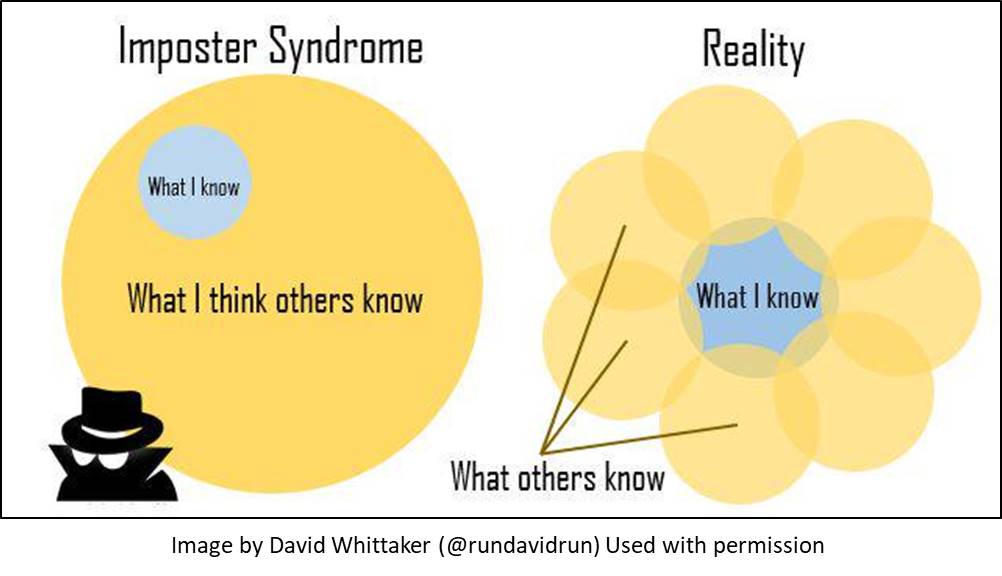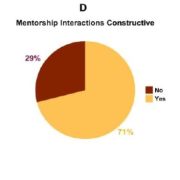Combatting the Impostor Syndrome in academic science – you probably are as smart as they think!
Rebecca Mosher is an Associate Professor in the School of Plant Sciences at the University of Arizona who studies small RNAs and epigenetics. You can reach her at @rm0sher .
Have you ever felt like you don’t belong in academic science? Do you think that you aren’t as smart as the people across the lab bench or that everyone else understands the seminar except you? Do you think that someone made a mistake accepting you in graduate school, publishing your paper, or giving you that fellowship? Do you worry that you’ll say something wrong and everyone will realize you are a fraud? If so, you might be suffering from Impostor Syndrome.
What is impostor syndrome?
Impostor Syndrome is the feeling that you don’t deserve your success or that you aren’t as smart as people think – that you are an impostor. For some people, Impostor Syndrome is a persistent anxiety, others experience bouts of Impostor Syndrome associated with accomplishments. Do any of these sound familiar?
- I only got this job/seminar invitation/fellowship because I’m a woman/Hispanic/funny guy.
- If only everyone knew how hard I worked, they’d know I’m not smart enough for ….
- I was lucky to discover X and get it published.
- I had a lot of help from my collaborators.
I bet you’ve heard friends and colleagues make comments like these, and chances are that you’ve said them to yourself as well.
Impostor syndrome is especially common in academic science, for a lot of reasons. For one thing, there is so much to know and it can seem that everyone knows things you don’t. And they probably do – just like you know things that they don’t! Recognizing others’ expertise, but not our own, can feed into feelings of being a fraud. Impostor Syndrome also develops because it is our job to criticize each other’s work. Participating in science means having your ideas picked apart by others, which can feed doubt about our abilities. Science is also an international enterprise, which means that many of us are literally wearing a mask every day – adopting the language and cultural norms of our adopted homes, which can exacerbate feelings of not belonging. This is especially true for underrepresented groups in science, who are particular susceptible to Impostor Syndrome. Finally, we all know that the research is never done – there is always another experiment needed or an alternative interpretation of the data. This can make it hard to recognize our research accomplishments.
If you remember nothing else from this post, I hope you remember that a lot of people feel like they are impostors. One study found that up to 70% of successful people have had impostor feelings at some point. Which means two things: 1) if you feel this way, you are not alone. 2) If you don’t feel this way, your students and colleagues probably do!

What does impostor syndrome look like?
 Beyond the anxiety that Impostor Syndrome causes, there are a number of behavioral patterns that people with Impostor Syndrome employ to avoid being “discovered” as an impostor. Some people overcompensate and do more work than is necessary. Do you really need to work through the night to submit the perfect abstract for the departmental retreat? Other people procrastinate. After all, if you throw together that abstract at the very last minute, then you have a built-in excuse for any mistakes. Or if you procrastinate editing that grant long enough, maybe your PI will submit it without your feedback.
Beyond the anxiety that Impostor Syndrome causes, there are a number of behavioral patterns that people with Impostor Syndrome employ to avoid being “discovered” as an impostor. Some people overcompensate and do more work than is necessary. Do you really need to work through the night to submit the perfect abstract for the departmental retreat? Other people procrastinate. After all, if you throw together that abstract at the very last minute, then you have a built-in excuse for any mistakes. Or if you procrastinate editing that grant long enough, maybe your PI will submit it without your feedback.
One of the most common behaviors associated with Impostor Syndrome is holding back. If you never apply for that fellowship, then no one will review your CV and see that you’re not as talented as everyone thinks; if you don’t ask a question in seminar, no one will realize that you didn’t understand slide 4; if you mimic the opinion of a superior rather than giving your own ideas, no one will be able to criticize you. Holding back might also mean not promoting your research when seeking collaborations, not asking to be nominated for awards, or not submitting an abstract for oral presentation – all of which could be pivotal events that launch a young academic’s career.
Is there a cure?
Luckily, there are some easy steps you can take to mitigate your Impostor Syndrome. Understanding these strategies can also help you mentor others who might be suffering from Impostor Syndrome.
- Learn to recognize your impostor thoughts, and then ignore them! It is easy to recognize impostor thoughts in others but it’s a lot harder to realize when you are explaining away your own accomplishments. Practice recognizing when you are having impostor thoughts and (gently) remind yourself that you are not an impostor. You don’t have to get rid of the thoughts, but make sure they are stopping you from succeeding. Talking about these feelings with trusted peers can also be very helpful in helping you to recognize them.
- When something good happens, tell yourself what you did to help it along. Did you remember a key piece of data from a paper you read and design a great experiment? Did you write a great abstract, leading to an invitation for a talk? Did you start a conversation at a conference and develop an essential collaboration? Luck and timing can play a role in our successes, but usually something we have done helps them along. Dr. Valerie Young recommends privately annotating your CV in this way to strengthen the connection between your actions and your success. And remember, working with others or asking for help counts as an accomplishment – it is something you have done to move toward success.
- Cultivate a growth mindset. The growth mindset is the idea that our talents are not fixed at birth, but can be developed through practice. One of the insidious aspects of Impostor Syndrome is viewing mistakes as shameful events to be avoided at all costs because they might result in the “discovery” of an impostor. With a growth mindset, mistakes or lack of knowledge aren’t signs of an impostor, but are instead opportunities for growth. Many scientific discoveries arose through mistakes, and we would never consider Darwin to be an impostor because he didn’t understand everything about evolution. A growth mindset will help you be less afraid of failure or criticism by re-envisioning your mistakes as opportunities to learn and improve.
- Trust your colleagues. There is something paradoxical in the idea that you aren’t as smart as everyone around you, yet you are smart enough to fool them every single day. Your mentors and colleagues see your talent constantly. If they think you are worthy of the fellowship, ready for the big talk, or competitive for the grant, then ignore that inner voice and trust them! If you feel comfortable, share with them your impostor feelings so that they can help you see how you have earned your success.
Overcoming impostor syndrome takes practice and doesn’t happen quickly, but these strategies will help you be happier and more comfortable with your accomplishments. Remember, most of us have impostor feelings at some point – it’s a natural reaction when you work in a critical environment with very smart people. So look around at all of the smart, accomplished people in your life and realize that you are no more of an impostor than they are!
References:
- Clance, Pauline Rose, and Suzanne A. Imes. “The impostor phenomenon in high achieving women: Dynamics and therapeutic intervention.” Psychotherapy: Theory, research and practice3 (1978): 241-247.
- Young, Valerie. The secret thoughts of successful women: Why capable people suffer from the impostor syndrome and how to thrive in spite of it. Crown Pub, 2011.
- Dweck, Carol S. Mindset: The new psychology of success. Random House Incorporated, 2006.
To read more, check out:
- BBC News on the Impostor Syndrome: http://www.bbc.co.uk/news/magazine-36082469
- The Guardian on the Growth Mindset: https://www.theguardian.com/small-business-network/2017/may/22/reeling-failure-perhaps-attitude-change-growth-mindset
- An inspiring story of overcoming the Impostor Syndrome: https://variablestargirl.com/2015/06/21/one-scientists-approach-to-the-imposter-syndrome/










This is very true. I guess I suffer from it too because I tell some of my friends that I’m not good enough and I don’t deserve the achievement I have attained. I am working to overcome it.